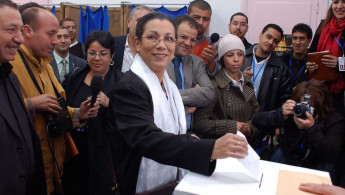Algeria: Opposition leader Louisa Hanoune quits presidential race over 'unjust' process
In Algeria, an opposition leader has withdrawn from the upcoming presidential, as several candidates criticise the "unjust" conditions and an anti-democratic legislative framework.
"The Workers' Party cannot participate in an electoral process that does not guarantee complete freedom to stand without exclusion and denies citizens the right to freely choose," said Louisa Hanoune, leader of the Algerian Workers' Party (Trotskyist), on 13 July.
Hanoune, a prominent opposition figure in the North African state, was detained in May 2019 during the height of the Hirak uprising and was accused of conspiring against the state and the army.
She was acquitted and released after approximately ten months in prison.
Hanoune's decision follows Algerian President Abdelmadjid Tebboune's recent announcement of his intention to seek re-election in the 7 September presidential race.
The 78-year-old politician stated his intention to seek another term based on "the desire of numerous political and non-political organisations, as well as the youth."
The leader of the Algerian Workers alleges there is an "intent to exclude the Workers' Party from the presidential election and undermine the people's right to freely choose between political platforms."
"In contrast to recent parliamentary elections in France and England, where people have demonstrated their ability to use elections to achieve their political and social aspirations, it is evident that such opportunities depend on respecting democratic freedoms to allow people to express their will," stated a press release from the opposition party.
Hanoune, who ran for president in 2004, 2009, and 2014, did not elaborate further but indicated her decision was based on information available to her.
Earlier in July, the Rally for Culture and Democracy (RCD), a major opposition party in the country, also announced it would boycott the September election for similar reasons to those cited by Hanoune.
Meanwhile, the Front of Socialist Forces (FFS) has decided to participate in the Algerian presidential election for the first time since 1999. Youcef Aouchiche, a 41-year-old politician, will be the official candidate for the pro-Amazigh party.
Zoubida Assoul, head of the Union and Change party and the first candidate to join the elections, remains in the race despite her criticism of the "unfair conditions" surrounding the election, the second since the Hirak movement.
In March, the Mouradia Palace announced the decision to hold early presidential elections on Saturday, September 7, 2024, without specifying the reasons for advancing the date by three months.
Since June 8, candidates have begun collecting the 50,000 voter signatures or 600 endorsements from elected officials across at least 29 provinces required for their candidacies to be validated. They have 40 days to submit their candidacy to the electoral committee. The official candidates list will be announced at the end of July and the electoral campaign is set to start in August.
Advancing the elections made Tebboune's opponents' mission harder – which has led to the speculations that Mouradia palace's announcement was set to catch opponents off guard and ensure Tebboune's victory.
Opposition candidates still in the race have criticised what they describe as "a slow and inefficient" administrative process, hindering signature and endorsement collection.
"Like in Tebessa (northeastern Algeria), attempts were made (by workers in the city hall) to dissuade citizens who wanted to sign for our candidate by telling them that if they sign for this opponent, they will be denied benefitting from social housing," stated a source from Hanoune's party to pan-African Magazine Jeune Afrique on 10 July.





 Follow the Middle East's top stories in English at The New Arab on Google News
Follow the Middle East's top stories in English at The New Arab on Google News


